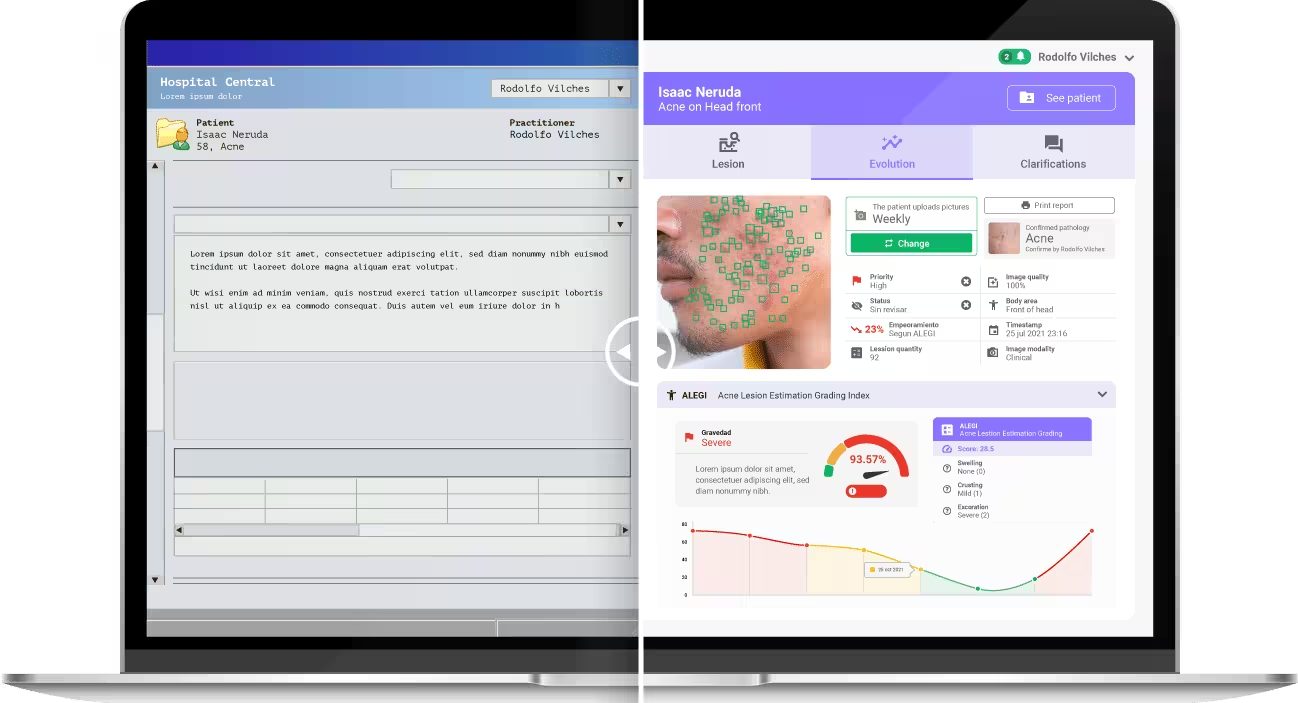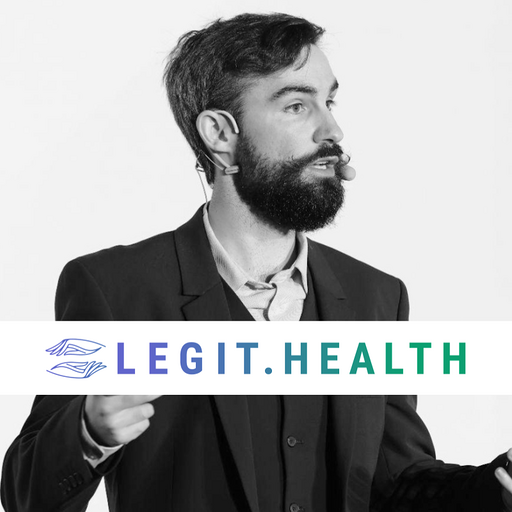Are Legit.Health's algorithms scientifically validated?
Legit.Health has been clinically validated in various healthcare settings by leading specialists in their fields. Our technology has demonstrated its effectiveness in enhancing diagnosis and follow-up, with specific studies focused on certain pathologies to assess sensitivity and precision.
Several of these studies are published in prestigious journals within dermatology, with others in varying stages of publication. Furthermore, we also provide clinical evidence during the process of certification as a medical device, some of which have not been made publicly available.
You can find a full list of our scientific evidente in the Validation section of our website.
Clinical validation
Find out everything about our clinical validation process and our scientific evidence, including publications, congress presentations, and clinical trials.
Roadmap
The following Gantt chart shows the roadmap of our clinical validation activities. Our commitment to advancing the state of the art motivates us to continuously expand our research.
Overview
As a sneak peek, here are some of the most recent publications and congress presentations that showcase the effectiveness of our technology.
The publications listed here do not include all of our work. Nor do they include evidence submitted to certifying bodies as part of our certification process as a medical device. Thus, it's not an exhaustive list, but rather a summary of our most popular evidence.
You can find a full list of our scientific evidente in the Validation section of our website.
Clinical validation
Find out everything about our clinical validation process and our scientific evidence, including publications, congress presentations, and clinical trials.
The technology behind Legit.Health is complex and multifaceted. Behind a seemingly simple process for the user, several algorithms interact with each other. Indeed, our technology integrates multiple algorithms to not only diagnose and assess disease severity but also optimize referral accuracy, ensure image quality, and gauge treatment efficacy.
Atopic Dermatitis
To learn more about our work on atopic dermatitis, check out the article dedicated to the Automatic SCORing of Atopic Dermatitis.
Our ASCORAD (Automatic SCORing of Atopic Dermatitis) study, a collaboration with Dr. Ramon Grimalt, was published in the Journal of Investigative Dermatology (JID) Innovations. This study details our approach to automating the severity assessment of atopic dermatitis and eczema.
Medela, A., Mac Carthy, T., Aguilar Robles, S. A., Chiesa-Estomba, C. M., & Grimalt, R. (2022). Automatic SCOring of Atopic Dermatitis Using Deep Learning: A Pilot Study. In JID Innovations (Vol. 2, Issue 3, p. 100107). Elsevier BV. https://doi.org/10.1016/j.xjidi.2022.100107
This work is further acknowledged in recent scientific literature, highlighting its potential to revolutionize AD severity assessment.
(...) very promising is the attempt to arrive at an automatic definition of AD severity by using CNNs (...) to achieve a scoring accuracy of erythema, papulation, excoriation, and lichenification severity comparable to that of dermatologists (...). Computational applicative advances in this direction have led to the more recent design of Automatic SCORing Atopic Dermatitis (ASCORAD).
Discover more about ASCORAD from its authors in this webinar (in Spanish).
In this video (in Spanish), Dr Ramon Grimalt and Alfonso Medela, both co-authors of the publication, explain what the paper is about.
Enhancing Dermatology E-Consultations in Primary Care Centres Using AI
To learn more about our work on atopic dermatitis, check out the article dedicated to the Project to enhance Dermatology E-Consultations in Primary Care centres using Artificial Intelligence Tools.
A prospective observational analytical and cross-sectional study designed to assess if the use of the medical device Legit.Health by dermatologists and primary care physicians increased the accuracy in the diagnosis of multiple dermatological conditions.
The results showed that Legit.Health significantly enhanced primary care physicians' diagnostic accuracy, increasing it from 72.96% to 82.22%.
| Condition | Accuracy (%) | Accuracy with Legit.Health (%) | Relative difference (%) | p-value |
|---|---|---|---|---|
| Actinic keratosis | 55.56 | 83.33 | 49.98 | 0.125 |
| Pustular psoriasis | 5.56 | 22.22 | 299.64 | 0.25 |
| Plaque psoriasis | 96.30 | 96.30 | 0.00 | 1.00 |
| Nevus | 75.56 | 77.78 | 2.91 | 1.00 |
| Melanoma | 86.67 | 91.11 | 5.12 | 0.69 |
| Urticaria | 73.33 | 91.11 | 24.24 | 0.02 |
| Hidradenitis suppurativa | 64.44 | 80.00 | 24.14 | 0.04 |
The impact of Legit.Health varied across different skin conditions, demonstrating significant improvements in hidradenitis suppurativa, urticaria, and actinic keratosis.
In this experiment, we found that 49% of cases should be referred according to the primary HCP with the information provided by the device, which is 17% lower than the aforementioned referral rates. Additionally, our results improve the remote consultation rates, suggesting that diagnostic support tools can help foster remote consultations.
| Condition | Do not require referral (%) |
|---|---|
| Nevus | 60.00 |
| Melanoma | 2.22 |
| Basal cell carcinoma | 7.41 |
| Urticaria | 88.89 |
| Pustular psoriasis | 11.11 |
| Actinic keratosis | 33.33 |
| Plaque psoriasis | 81.48 |
| Hidradenitis suppurativa | 71.11 |
Optimization of teledermatology in primary care | Dr Gastón Roustán Gullón | AEDV 2024.
Do you want to see the clinical AI technology in action?
Hidradenitis Suppurativa
The AIHS4, our novel system for scoring Hidradenitis Suppurativa, is detailed in Skin Research and Technology. This study exemplifies our commitment to developing practical AI solutions for complex dermatological conditions.
Hernández Montilla, I., Medela, A., Mac Carthy, T., Aguilar, A., Gómez Tejerina, P., Vilas Sueiro, A., González Pérez, A. M., Vergara de la Campa, L., Luna Bastante, L., García Castro, R., & Alfageme Roldán, F. (2023). Automatic International Hidradenitis Suppurativa Severity Score System (AIHS4): A novel tool to assess the severity of hidradenitis suppurativa using artificial intelligence. In Skin Research and Technology (Vol. 29, Issue 6). Wiley. https://doi.org/10.1111/srt.13357
The AIHS4 has been echoed in recent scientific publications, such as the following article by the National Research Council of Italy, and the Universities of Palermo and Messina:
(...) to overcome the IHS4, which is time-consuming and subject to variability, the AIHS4 is introduced, using a DL model, Legit.Health-IHS4net, for lesion detection (...). This evidence highlights the utility of AI in evidence-based dermatology, offering a potential tool to empower dermatologists in daily practice and clinical trials.
You can find a full list of our scientific evidente in the Validation section of our website.
Clinical validation
Find out everything about our clinical validation process and our scientific evidence, including publications, congress presentations, and clinical trials.
Urticaria (Hives)
The Automatic Urticaria Activity Score (AUAS) system has been published in the Journal of Investigative Dermatology (JID) Innovations, showcasing our deep learning-based approach for urticaria severity assessment.
Mac Carthy, T., Hernández Montilla, I., Aguilar, A., García Castro, R., González Pérez, A. M., Vilas Sueiro, A., Vergara de la Campa, L., Alfageme, F., & Medela, A. (2024). Automatic Urticaria Activity Score: Deep Learning-Based Automatic Hive Counting for Urticaria Severity Assessment. In JID Innovations (Vol. 4, Issue 1, p. 100218). Elsevier BV. https://doi.org/10.1016/j.xjidi.2023.100218
Our work on the AUAS was presented at congresses such as the AEDV annual meeting in the year 2021. The following video shows a short explanation of the AUAS in the congress mentioned above:
Image Quality
We also publish our research regarding non-diagnostic technology. Such is the case of the Dermatology Image Quality Assessment (DIQA) technology, which ensures the clinical utility of images for remote consultations and clinical trials. This was published in the Journal of the American Academy of Dermatology.
Hernández Montilla, I., Mac Carthy, T., Aguilar, A., & Medela, A. (2023). Dermatology Image Quality Assessment (DIQA): Artificial intelligence to ensure the clinical utility of images for remote consultations and clinical trials. In Journal of the American Academy of Dermatology (Vol. 88, Issue 4, pp. 927-928). Elsevier BV. https://doi.org/10.1016/j.jaad.2022.11.002
Work with us

At Legit.Health, we are working to further improve the technology, striving to create even better tools. This includes, for example, improving the differentiation between types of HS lesions, or ensuring that the technology works correctly across all skin phototypes.
If you would like to work with us, please fill out the following form and we will contact you as soon as possible.
Get started
AI-powered dermatology validated by peer-reviewed research. Trusted by leading hospitals across Europe. Fill in the form to see how our CE-marked platform can transform your practice.





